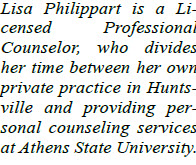The Stalking Victim
 By: Lisa Philippart
By: Lisa Philippart
January is Stalking Awareness Month, and in my last article, we took a look at the stalker, stalking and mental illness, and the types of stalking. In this article, we will focus on the victims…the reasons action may not be taken and the effects on mental, physical, and social health. What might prevent a victim from seeking help? Some victims may not understand what is happening to them. They may not realize what stalking is and that it is illegal. Unfortunately, some victims are in denial, pretending that it is not happening or believing that they should be able to deal with the situation. I have seen cases where the victim thinks that the stalker can be “reasoned with,” or just doesn’t want to get the stalker in trouble. Some victims fear that others will think they are overreacting, or that they will be blamed for somehow having encouraged the stalker in the first place. These folks tend to be those who have had a previously intimate relationship with the stalker, even if it was only brief or flirtatious. Victims may be fearful about how the stalker will respond either to them or those that they love or care for. The stalker may have directly threatened the victim with some sort of retaliation.

Stalking victims may feel isolated in their situation, believing that there is nothing that can be done, or not knowing who to go to for help. In some cases, the victim has sought help, but has been ignored or may have financial limitations with regard to seeking legal advice or taking time off work to seek help. Through community surveys and smaller studies of specific victim groups, we are beginning to understand the devastating effects of stalking victimization. In addition to the fear and possibility of injury due to assault, research has shown that victims suffer a wide variety of psychological, physical, social, and general lifestyle effects as a consequence of being stalked. As with many aspects of stalking, the experience and impact can vary greatly among victims, with behaviors that may be considered annoying to one person, having a shattering effect on another. Further, the impact of stalking may vary according to the victim’s characteristics, past experiences, current circumstances, and knowledge, or lack of knowledge, of the stalker. Even how others respond to the victim’s situation can influence the overall effect that the stalking incident has on the victim.

What are the effects to the stalking victim’s health? Mentally, stalking can cause a victim to be in denial, confusion, and self-doubt. The victim may question, “Is what is happening unreasonable?” or “Am I overreacting?” Victims become frustrated, embarrassed, or even blame themselves. Feelings of guilt can become overwhelming. Apprehension, fear, fear of being alone, or that they or others will be harmed can lead to feelings of isolation and helplessness. Over time, depression, anxiety, panic attacks, and agoraphobia (fear of leaving the house) may develop. Taken to the extreme, some victims experience Post-traumatic Stress Disorder symptoms, such as hypervigilance, frightening flashbacks, and heightened startle response. The effects on the stalking victim’s physical health include fatigue from difficulty sleeping, the effects of chronic stress including headaches and hypertension, and development or exacerbation of pre-existing conditions. Some victims experience dizziness, shortness of breath, heart palpitations, and sweating. The effects of stalking on the victim’s social life include insecurity and inability to trust others and problems with intimacy. Some victims avoid usual activities, isolating to protect themselves and others. This leads to others withdrawing from the victim either because they don’t believe them or they are unable to cope with the victim’s mental and emotional state. Some victims have chosen to move to a new area, change phone numbers, their names, or even their appearance.

So what can you do if you are being stalked?
1. Trust your instincts. Victims of stalking often feel pressured by friends or family to downplay the stalker’s behavior, but stalking poses a real threat of harm. Your safety is what’s most important.
2. Call the police if you feel you are in any immediate danger. Explain why even some actions that seem harmless—like leaving you a gift—are causing you fear.
3. Keep a record or log of each contact with the stalker. Be sure to also document any police reports.
4. Stalkers often use technology to contact their victims. Save all e-mails, text messages, photos, and postings on social networking sites as evidence of the stalking behavior.
5. Call the National Domestic Violence Hotline at 1–800–799–SAFE or the Victim Connect Helpline at 1-855-484-2846.
By: Lisa Philippart
Licensed Professional Counselor